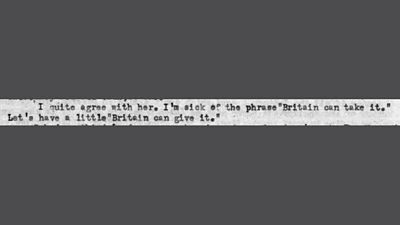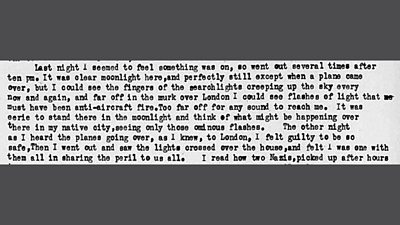When the Blitz began in the early-autumn of 1940, the ����ý came under aerial attack like the rest of the country. Indeed, as newly-released archive material shows, it was almost certainly being specially targeted by the Luftwaffe. Broadcasters, like their fellow citizens, were forced to work - and live - under extraordinary conditions. And the story of their eight months under constant siege can be brought back to life through hearing some of the recorded memories they left behind.
By September 1940, the large-scale German air raids which had been expected twelve months earlier finally arrived. London, and cities and towns across the country - especially the big ports and industrial centres - were being bombed almost every night.
Several members of staff who had been despatched to Wood Norton or Bristol at the outbreak of war had already started to drift back to Broadcasting House, despite knowing that the ����ý’s iconic buildings and transmitters were likely to be high on the list of enemy targets.
Clare Lawson Dick, who worked in the Secretariat, was among them. She had enjoyed her time at Wood Norton. But for her, London was ‘home’. And it was in Broadcasting House that she ‘joined one’s tribe and took part in the rituals we all understood so well, continually gossiping with one another, eating reconstituted eggs, drinking ersatz coffee…’. ‘Never shall I forget the intensity of that communal life’, she would later say.
To begin with, every day after work, Lawson Dick would travel back to her own flat. When it was hit by an incendiary bomb, she gathered up her belongings and moved into Broadcasting House.
Like many of her colleagues, she then began the strangest of existences, working on the upper floors during the day, and descending to the basement floors as the sirens went at dusk:
Sorting out sleeping-space for as many of its employees as possible, was an organisational nightmare for the ����ý. Senior staff, including the Director-General himself, already had their make-shift bunks dotted around various basement rooms or tucked into cubby-holes near the newsroom so that they could be on-call around the clock.
Most staff, though, would need to share. This meant some sort of rota system, and attention to hygiene, would be needed.
Stuart Williams, who had been responsible for the Monitoring unit’s accommodation at Wood Norton, was now put in charge of night-time arrangements in the capital:
While hundreds of men and women tried to sleep in one of these makeshift dormitories, others who had finished their regular shift were required to climb to the very top of Broadcasting House to take a turn on fire-watch duty, a pattern repeated nightly at ����ý buildings and transmitter stations around the country.
In the following extract from his oral history interview, Alec Sutherland provides a colourful, if slightly terrifying description of his own first night on fire-watch, only a matter of hours after he had been given basic training by one of the Corporation’s house staff:
London, however, was far from alone. Other cities, and other ����ý centres, were also under near-constant attack in the Blitz.
In November 1940, three staff at a transmitter in Birmingham were killed. In February 1941, the ����ý’s Swansea studios were burnt down. The Luftwaffe’s attacks on Bristol were particularly devastating, and meant some swift relocations: Variety staff headed off to Bangor and Weston-Super-Mare, Music to Bedford.
The strange mixture of people now left behind in Bristol were thrown-together as never before in their efforts to keep the place safe and functioning.
David Davis, who made Children’s Hour, was among those holding the fort, and recalled everyone trying to make the most of a difficult situation:
It’s striking how in this account Davis uses the words ‘hilarious’ and ‘nasty’ in almost the same breath.
The Blitz is often remembered in mythical terms: a story of Britons resolute and united in the face of external attack. The accounts collected by Mass Observation easily disabuse us of this simple interpretation.
In Sussex, the pages of Adelaide Poole’s diary were frequently filled with rage: anger at the ����ý for its music programmes, loss of ‘all faith in the Government, even Churchill’ over its treatment of refugees from Nazi Germany, irritation towards the people around her who fiddled the rations.
On 27 February 1941, she reflected on a conversation she’d just had with a relative in Hove who had been wondering when the Government would order retaliation for the bombing. And her verdict was succinct, even brutal:

Yet, only weeks earlier, her diary was full of generosity and fellow-feeling:

There were mixed emotions everywhere, and the ����ý was no exception. During the war, broadcasters were often kept apart from the rest of the civilian population, working behind sealed doors in a ‘troglodyte’ world, always half-shrouded in secrecy.
Yet in the Blitz, they experienced much in common. Like most Britons, they could enjoy the camaraderie of wartime, and sometimes even have a little fun, while also feeling a sense of vulnerability, nervousness, foreboding, and sometimes outright terror.
Clare Lawson Dick embodies these contradictory feelings wonderfully. She had by this stage come to regard the Broadcasting House basement as her ‘burrows’. ‘To come in from the Blitz’, she said, ‘brought the inner glow of arriving at the place where one was meant to be’.
Yet it was here, too, that she felt moments of real trauma, moments which brought home to her and others inside the ����ý the real cost of conflict.
Indeed, the full range of human emotions, from wretchedness through to amusement, are captured in this last, highly personal extract from her oral history interview:
That night, the Luftwaffe came horribly close to Broadcasting House itself.
In the next section, The , we draw on newly-released archive material to tell the story of the two occasions in 1940 when enemy bombs finally landed right on target.
Further reading:
- Juliet Gardiner, The Blitz: The British Under Attack (2010)
- Richard Overy, The Bombing War: Europe 1939-1945 (2014)

